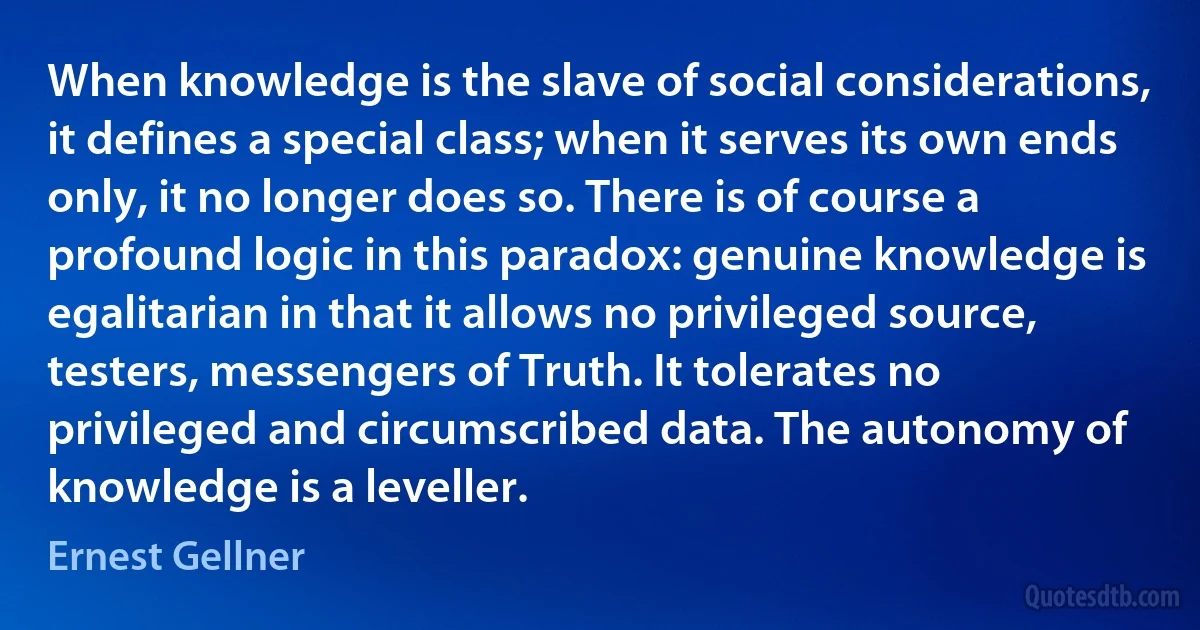Ernest Gellner quotes
In brief, nationalism is a theory of political legitimacy, which requires the ethnic boundaries should not be cut across political ones, and, in particular, that ethnic boundaries within a given state a contingency already formally excluded by the principle in its general formulation should not separate the power holders from the rest.

Ernest Gellner
(J. L. Austin's) admirers claim that his supreme preoccupation was truth. His work, with its sad conjunction of extraordinary cunning in presentation with very thin content, leaves rather the impression of a man who had little sense of real problems but who liked winning arguments and dominating people in the course of them, and who was well equipped to gratify his taste. He was the supreme dialectical poker player, unsurpassed at making people believe that their bluff had been called when in fact they weren't bluffing, and at stone-walling any attempt to call his own. It would be hypocritical not to say all this. Hypocrisy might not matter, but it would also be unfair to those students who are still conned into supposing that this kind of philosophizing has much in common with serious intellecual endeavour.

Ernest Gellner
The new perspective also manifested itself in other ways: the shift of attention to sociologists such as Max Weber who were primarily concerned, not with overall 'development', but with the one specific development, that of modern society; the tendency to be concerned with those aspects of Marxism relevant to this one transition, and to ignore its Evolutionist aspects; and, recently and most characteristically, the concern with the notion of industrial society, and its antithesis, to the detriment of other classifications, oppositions and alternatives.

Ernest Gellner
Looking at the contemporary world, two things are obvious: democracy is doing rather badly, and democracy is doing very well. New states are born free, yet everywhere they are in chains. Democracy is doing very badly in that democratic institutions have fallen by the wayside in very many of the newly independent 'transitional' societies, and they are precarious elsewhere. Democracy, on the other hand, is doing extremely well in so far as it is almost (though not quite) universally accepted as a valid norm.

Ernest Gellner
In the twentieth century, the essence of man is not that he is a rational, or a political, or a sinful, or a thinking animal, but that he is an industrial animal. It is not his moral or intellectual or social or aesthetic ... attributes which make man what he is. His essence resides in his capacity to contribute to, and to profit from, industrial society. The emergence of industiral society is the prime concern of sociology.

Ernest Gellner
The model that can be drawn up, of a plural society in which the multiplicity of forces and institutions prevent any one of their number dominating the rest, and which function on the basis of a broad and non-doctrinaire consensus - this picture does not warm the blood like wine. To appreciate and savour its appeal, one needs a rather sophisticated taste, perhaps.

Ernest Gellner
It is this which explains nationalism: the principle - so strange and eccentric in the age of agrarian cultural diversity and the 'ethnic' division of labour - that homogeneity of culture is the political bond, that mastery of (and, one should add, acceptability in) a given high culture ... is the precondition of political, economic and social citizenship.

Ernest Gellner



